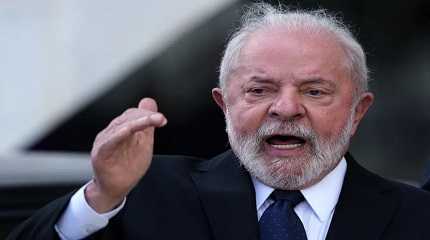
RIO DE JANEIRO, Aug 11 (Reuters) - The "growth acceleration" plan launched by Brazil on Friday foresees 1.7 trillion reais ($347.5 billion) in investments that will rely increasingly on public-private partnerships, while driving a new ecological transition plan, the government said.
The program, known as PAC, revisits an initiative that President Luiz Inacio Lula da Silva first introduced in 2007 during his earlier term in office to raise investments in energy, logistics, and urban and social infrastructure.
It was later expanded under his successor, former President Dilma Rousseff. Critics say it incurred excessive spending, exacerbating Brazil's fiscal crisis, while failing to bring fundamental advances in infrastructure.
This time Lula's government says the plan will follow a path marked by stronger partnerships between the public and private sectors, with more than 1.3 trillion reais estimated to be disbursed by 2026.
"This PAC is different from the other ones. The state will stimulate PPPs," Lula's Chief of Staff Rui Costa said at the launch of the program in Rio de Janeiro. He added there would be "fiscal and environmental responsibility" while looking after social needs.
"It's time we buried the idea that social responsibility is fiscal irresponsibility," he said.
According to the government, 371 billion reais - or 22% of the total - are set to be invested by the federal government, while state-owned firms such as oil giant Petrobras (PETR4.SA) would inject 343 billion.
The private sector is seen investing a total 612 billion reais. The government did not immediately detail the fiscal impact of the initiative, or give a specific time frame for the plan.
Even though the plan includes several projects in the oil and gas sector led by Petrobras, and investment in the pre-salt offshore oilfields, Lula's team emphasized its environmental goals and announced an "ecological transition plan."
Lula has staked his international reputation on reversing environmental back-sliding under his far-right predecessor Jair Bolsonaro, when Amazon deforestation soared. Yet Lula is under pressure to deliver much-needed growth to poor, under-developed regions and he wants Petrobras to be an engine of growth.
The PAC does not included funding for paving of the BR-319 highway through pristine parts of the Amazon rainforest that the Bolsonaro government planned and environmentalists warn would cause irreversible damage.
Finance Minister Fernando Haddad said the ecological plan would be focused on establishing a regulated carbon credit market, issuing sustainable sovereign bonds and reformulating a climate fund that aims to bring down emissions.
"We'll accelerate growth in our country and help stop degradation of our planet," Haddad said in a speech.
($1 = 4.8925 reais)




